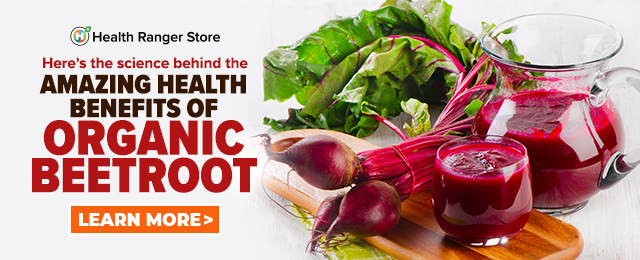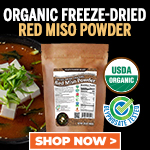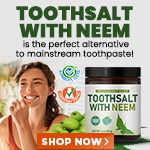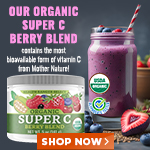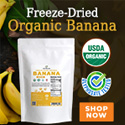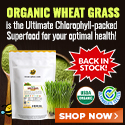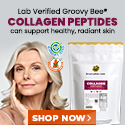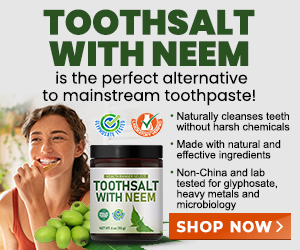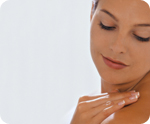
Certified Organic Skin Care: No Seal No Deal?
Tuesday, November 27, 2007 by: Dani M
Tags: personal care products, skin care, cosmetics
- Newly released JFK files reveal Pentagon's role in creating Lyme disease and covid in the same lab
- Woman contracts WORLD'S DEADLIEST VIRUS after unknowingly being given the WRONG VACCINE
- Kiss Your Genetic Privacy Good-Bye! 23andMe Gets Green Light to Sell Your Intimate Genetic Details to Anyone They Want
- AI weather model outperforms traditional forecasts, boosts accuracy by 20%
- Revolutionize your diet with pomegranate: The miracle juice for gut health and metabolism
- Advisory: Ex-FBI agent exposes likely ATF honeypot operation selling illegal Glock switches
- The case for locking up the Deep State's biggest hatchet man...
- Analysis: The coming economic collapse, a mass uprising and Trump's three secret weapons to halt the growing revolt
- Sweden's migrant crisis deepens as failed green energy venture leaves thousands jobless, exposes systemic collapse
- At least 75 percent of Americans are unknowingly MEDICATED FOR STUPIDITY by fluoridated water – Utah now banning it
- U.K. unveils controversial pandemic preparedness tool: A double-edged sword?
- DHS Secretary Kristi Noem plans to dismantle FEMA
- Trump administration CUTS FUNDING to Gavi, the Vaccine Alliance - a major blow to the Bill Gates-backed entity
- Health Ranger Report: Ashton Forbes discusses TELEPORTATION ORBS and their role in MH370 disappearance
- Pediatric dentist exposes fluoride dangers as more states ban toxic water additive
- We are closer to all-out war in Europe, in Asia, and in the Middle East than most people realize
- Can special diets and supplements help kids with autism? A new research offers hope and hints at what works
- Gold reaches all-time high amid escalating trade tensions
- Newly released JFK files reveal Pentagon's role in creating Lyme disease and covid in the same lab
- Analysis: The coming economic collapse, a mass uprising and Trump's three secret weapons to halt the growing revolt
- Trump nominates VACCINE ZEALOT Susan Monarez to lead the CDC, sidelining RFK Jr.'s reform efforts
- Trump's greatest betrayal so far: Accelerating Middle East wars, silencing dissent, and serving Zionist masters
- CDC finally halts $11 billion COVID funding scam as health officials admit the ‘pandemic’ was a fraud
- The hidden dangers in your kitchen: How cooking methods impact diabetes, cancer and aging
- BEWARE: USDA allows genetically engineered vaccines to infiltrate organic food production
- Obama accused of laundering USAID funds to fuel global protest movements, regime change operations
- DEADLY DECEPTION: How COVID vaccines increased mortality rates and why authorities hid the truth
- Here are TEN all-natural ways to protect your garden without using harmful chemicals
- Dr. Mike Yeadon releases 15-minute testimony - WATCH - about genocidal intent of COVID “vaccines”
- Festive flavors: The sweet history, nutritional profile and health benefits of pecan pie
- Big Pharma's media takeover: How drug companies bought the news - and your health
- Dr. Suzanne Humphries makes bombshell appearance on Joe Rogan podcast, exposing vaccine industry deception back to POLIOMYELITIS
- Elon Musk: Aliens could be here on Earth RIGHT NOW
- 5 Simple steps to boost your brainpower: How to strengthen executive function in a distracted world
- Trump reverses course on Gaza plan, says “nobody is expelling Palestinians”
- California's social media censorship law struck down: A victory for free speech or a threat to online safety?
- Newly released JFK files reveal Pentagon's role in creating Lyme disease and covid in the same lab
- EPA advisor admits the agency is funneling billions to climate groups ahead of Trump’s return to White House
- California's social media censorship law struck down: A victory for free speech or a threat to online safety?
- Dr. Mike Yeadon releases 15-minute testimony - WATCH - about genocidal intent of COVID “vaccines”
- The Health Ranger releases “Vaccine Zombie” song and music video, using AI-animated zombies for the music video
- Florida takes a stand: DeSantis proposes permanent ban on mRNA vaccine mandates
- The pandemic as a tool for INDOCTRINATION: Understanding “The Indoctrinated Brain” by Dr. Michael Nehls
- “Why we influenced the 2020 elections”: Facebook files reveal the coordinated effort to bury the Hunter Biden laptop story
- Mike Adams releases country western hit single: Goin’ Back in Time is Comin’ Home
- Mike Adams releases music poetry sensation: A Child of God
- Unpacking the Lies That We’ve Been Fed – new song and music video released by Mike Adams, the Health Ranger
- Michigan sheriff announces criminal investigation into 2020 election crimes, Dominion Voting Systems
- Migrants are taking advantage of recent hurricanes to scam residents and loot their homes
- House Intelligence Committee calls for the ARREST and PROSECUTION of Dr. Anthony Fauci
- Rep. Nancy Mace introduces bill to ban biological males from female facilities on federal property
- Peter Rost exposes Big Pharma corruption in his book “The Whistleblower: Confessions of a Healthcare Hitman”
- Former horse rancher and 6,000 other plaintiffs are suing Syngenta after paraquat exposure led to Parkinson's Disease
- Mike Adams releases new song and music video: Nothing More Disgusting Than a Globalist
- Red Cross issues warning to stop blood plasma donations from vaccinated people
- Scientists confirm: GENIUS brain function can be spontaneously unleashed in humans without any apparent cause
- EPA advisor admits the agency is funneling billions to climate groups ahead of Trump’s return to White House
- HYSSOP: What research reveals about the health benefits of this ancient holy herb
- Two containers with completed ballots fall out of truck in Florida
- Fully vaccinated about to see “tsunami” of illness and death, warns virologist
- Global leaders unite to clamp down on “misinformation” with UN-backed Cascais Declaration
- BREAKING: 2025 NDAA authorizes mandatory military draft of WOMEN across America… as Pentagon pursues global NUCLEAR war with both Russia and China at the same time
- Michael Yon warns of a ZIONIST TAKEOVER in Trump’s second administration
- BOMBSHELL: DNA testing kits are a SCAM to develop ethnic-specific bioweapons
- Ozempic and Wegovy weight loss drugs are injectable LIZARD VENOM PEPTIDES that may unleash a devastating wave of organ failure… side effects align with symptoms of SNAKE BITES
- Israeli soldiers accused of even more torture and abuse in the West Bank
- These 13 countries just signed an agreement to engineer a global FAMINE by destroying food supply
- NASA admits that climate change occurs because of changes in Earth’s solar orbit, and NOT because of SUVs and fossil fuels
- RFK Jr. clears key hurdle: Sen. Susan Collins backs controversial HHS nominee, signaling a new era for health policy
- Sermon 30: How Jesus reveals Caesar’s FAKE CURRENCY and FALSE AUTHORITY
- Coriander seeds: Ancient medicine backed by modern science
- Arizona officials claim Maricopa County needs 10-13 days to tabulate results of the election
Well if you're from the school of thought of "you are what you eat", then yes, it absolutely does matter. If you're not so sure, then this might be an eye opener for you. First a little Skin Trivia - Studies have proven, time and time again, that nothing you apply on your skin stays on the surface unless you immediately rinse it off. Your skin, being your bodies largest organ, has over 1 billion pores. It is your body's first line of defense against anything entering your body. Ironically, it is also a giant sponge, absorbing anything you put on it. It usually takes 10-15 minutes for a product to be completely absorbed into your skin, by this time, it is inside your body, "subcutaneously", which means underneath your skin. By this time, you cannot rinse it off.
The dilemma:
This leaves us with the dilemma that, if we apply lotions, perfumes, make-up, oils, deodorants and other cosmetics on a daily basis, the stuff will definitely get absorbed and inside. So in essence, you are FEEDING your skin whatever that product is. Simply put, if you wouldn't eat it, you probably shouldn't be putting it on your skin, make sense? Your skin is a living organ, similar to your other organs like your digestive system. So if you are eating organic foods but using synthetic and toxic skin care products, it sort of defeats the purpose of what your trying to do.
A lot of people see this dilemma, and now more and more companies are coming out with products termed as "All Natural", "Organic" and "Cruelty Free" to meet consumers healthier demands. This seems great, but has only made things harder because shopping can be pretty difficult if you don't know what to look for. The only thing you know is that you want only natural, organic products on your skin; but how can you really tell what's truly organic?
What to look for at the store:
The bottom line is that you need to read the ingredients list and make sure that it contains NO synthetic chemicals. Yes, you must take time to read the label! But no worries, pretty soon these chemicals will begin to be sound more and more familiar (as they are on nearly everything at the grocery store Personal Care aisle, for example). Soon you'll be reading labels in less than 5 seconds like a pro!
The most common synthetic chemicals used in skin care products are:
1. Propylene Glycol (PG) and Butylene Glycol
2. Sodium Lauryl Sulfate (SLS) and Sodium Laureth Sulfate (SLES)
3. DEA (diethanolamine), MEA (monoethanolamine) & TEA (triethanolamine)
4. Polyethylene Glycol (PEG 4 - 200)
5. Sodium Hydroxide
6. Triclosan
7. DMDM and Urea (Imidazolidnyl)
8. Parabens (Methyl, Butyl, Propyl.. etc)
9. Alcohol, Isopropyl (SD-40)
10. Mineral Oil
11. FD&C Color Pigments
12. Fragrances (synthetic fragrances will have names like "essential lavender oil", because no lavender was even used!)
There are many more, but we'll start with the deadly dozen so you don't get too overwhelmed. What these chemicals actually are and do to your skin is another topic (not a pleasant one either), but let's just say they are no different than what's in your anti-freeze or in your laundry detergent. No reputable organic, natural or holistic company will use ANY of these because there are always natural alternatives to the chemical ones. Furthermore, you cannot make a truly organic product with synthetic chemicals. So, even if the name or packaging lures you with words like "all natural", "healthy", "holistic", "cruelty free" and even the very word "organic", turn that package right around and let that ingredient label speak for itself!
Another hint - the first 3 are what mainly comprises the product, making the last ingredients what's least in there. Sadly, some cosmetic companies put products out there with names like "Aloe Lotion", when Aloe is the very last ingredient on that list (and usually it's some petty form like"aloe extract", the sneaks!) So is it truly "Aloe lotion" or more like "Water + Mineral Oil Lotion"?
Go to your bathroom right now and check it out, there's a whole world of labels to be discovered right in your own home. It's an eye opening experience. Have a trash bag ready; so what do those organic seals mean? Well, if you've found a skin care product with an organic certifying seal, let's just say it's probably good (or at least a step ahead of most). Most natural skin care products have never, until recently, had organic seals certifying them like food items. Again, with the raging consumer demand for more organic products, organic certifier seals have been showing up on a lot of skin care products. It takes time, effort and money to get organically certified. Chances are, if a company went that extra mile to get that seal of approval, their stuff and the ethics behind their stuff is probably really good (or at least well intentioned).
Organic cosmetic certifiers:
There are Seals, and then there are "Seals"... The following is a list of organic certifying seals you will commonly find on most cosmetics out there. Unfortunately, this list is in a particular order. That is, from the best and most stringent, to the just OK:
1. USDA Organic (95-100% organic)
2. Australian Certified Organic (95%-100% organic)
3. European Union/Agriculture Biologique (at least 95% organic)
4. BIO/Germany (at least 95% organic)
5. QAI (at least 70% organic)
6. CAAQ/Canada (at least 70% organic)
7. Eco Cert (at least 10% organic of total ingredients)
Differences between "Natural" and "Organic":
Same thing, grown differently. Some products will not have any of the synthetic chemicals listed above and therefore be termed as "all natural", "toxin/chemical free" or say things like, "No SLS, Glycols, or Parabens". Please note, "NATURAL" DOES NOT MEAN "ORGANIC"! For example, a conventionally grown tomato is "natural", but it was grown using pesticides and sewage sludge; so it's not "organic". See the difference? Organically grown fruits and vegetables have significantly lower levels of nitrates, and higher levels of antioxidants and vitamins particular to that fruit or vegetable.
The same theory applies for skin care products. A Papaya-Coconut Lotion can have 100% natural ingredients with no synthetics, but if the papaya, coconut and the rest of the stuff in there is not organic, then it was grown using pesticides and therefore can only be termed "all natural" but not organic. This All Natural Papaya-Coconut Lotion would be an inferior product compared to a Certified Organic Papaya Lotion.
No seal no deal?
The organic certifying seal guarantees that some if not all the ingredients are organic. So if the seal is not there on the skin care product, should you not buy it? That is up to you, the consumer. It's the difference between buying conventional and organic tomatoes, going back to the example above. The important thing here is, to make an informed decision, that is all. Just know what you are buying, and what that entails for your skin, as well as the earth. The more savvy we become about reading labels, ingredient lists, and knowing exactly where the stuff came from which we put on our faces, eyes, skin and hair; the more companies will begin to comply to our standards. We are the ones in charge, really. No person truly wants chemicals on their skin, people just want a product that works. The "greener" of a world we become, the more the idea of organic skin care products that actually work for us and the earth will become a reality. After all, where else are we gonna go?
About the author
Dani Melgoza has a degree in Mass Communications and Journalism from Cal Berkeley. She is passionate about natural, holistic skin care products that are both good for the skin and earth alike. If you want the skinny on non-toxic, natural skin care products on the market that really work (and don't work), you have come to the right place!Personal care products at FETCH.news
Get independent news alerts on natural cures, food lab tests, cannabis medicine, science, robotics, drones, privacy and more.
Take Action: Support Natural News by linking to this article from your website
Permalink to this article:
Embed article link: (copy HTML code below):
Reprinting this article:
Non-commercial use OK, cite NaturalNews.com with clickable link.
Follow Natural News on Facebook, Twitter, Google Plus, and Pinterest
Science News & Studies
Medicine News and Information
Food News & Studies
Health News & Studies
Herbs News & Information
Pollution News & Studies
Cancer News & Studies
Climate News & Studies
Survival News & Information
Gear News & Information
News covering technology, stocks, hackers, and more



"Big Tech and mainstream media are constantly trying to silence the independent voices that dare to bring you the truth about toxic food ingredients, dangerous medications and the failed, fraudulent science of the profit-driven medical establishment.
Email is one of the best ways to make sure you stay informed, without the censorship of the tech giants (Google, Apple, Facebook, Twitter, YouTube, etc.). Stay informed and you'll even likely learn information that may help save your own life."
–The Health Ranger, Mike Adams











